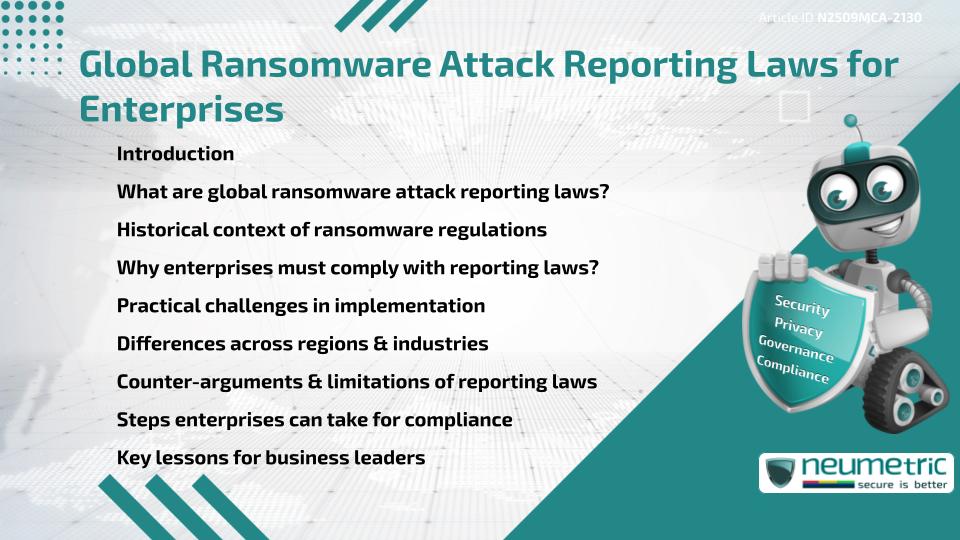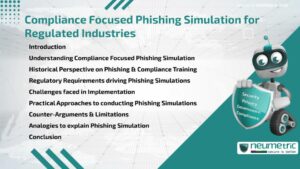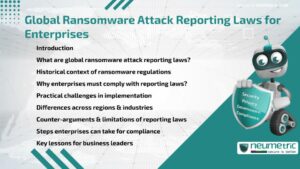Table of Contents
ToggleIntroduction
Global ransomware attack reporting laws are becoming central to enterprise security compliance as cyberattacks increase in scale & complexity. These laws define when, how & to whom businesses must disclose ransomware incidents. They help ensure transparency, protect Stakeholders & strengthen global security frameworks. Enterprises face both opportunities & challenges with these regulations, which vary widely across regions. This article explains the historical roots, practical implications & diverse perspectives surrounding global ransomware attack reporting laws, helping Organisations navigate compliance effectively.
What are global ransomware attack reporting laws?
Global ransomware attack reporting laws are legal requirements that compel businesses to disclose ransomware incidents within defined timelines. Such laws are designed to reduce the impact of cyberattacks by ensuring swift reporting to regulators, customers & in some cases, the public. They typically cover details such as the nature of the attack, the scope of data compromised & the mitigation steps taken.
These laws not only protect consumers but also create accountability for enterprises. Similar to how Financial regulations require disclosure of fraud, ransomware reporting laws ensure businesses cannot conceal significant cyber incidents.
Historical context of ransomware regulations
The roots of ransomware reporting laws lie in broader Cybersecurity & Data Protection legislation. For instance, the European Union’s General Data Protection Regulation (GDPR) set the precedent by mandating breach notifications within seventy-two (72) hours. The rise of ransomware in the past decade forced regulators to tailor reporting rules specifically for such attacks.
The United States followed with sector-specific obligations, such as those enforced by the Securities & Exchange Commission (SEC) and health-sector rules under HIPAA. Countries in Asia, such as Singapore & Japan, have also introduced ransomware-focused obligations as part of their Cybersecurity frameworks.
Why enterprises must comply with reporting laws?
For enterprises, compliance with global ransomware attack reporting laws is not optional. Non-compliance can result in heavy fines, legal consequences & reputational damage. Customers, investors & regulators expect full disclosure of cyber incidents.
Compliance also strengthens trust. Just as airlines must report safety incidents, enterprises must demonstrate accountability in Cybersecurity. By adhering to reporting laws, Organisations reinforce their role as responsible custodians of data.
Practical challenges in implementation
Despite their importance, ransomware reporting laws present practical challenges. Enterprises often struggle with:
- Complex timelines: Different regions demand disclosure within varying hours or days.
- Defining Scope: Determining whether an incident qualifies as a reportable ransomware attack can be unclear.
- Global operations: Multinational enterprises must reconcile conflicting legal requirements.
- Resource strain: Small & medium enterprises face difficulties in building reporting infrastructure.
These hurdles often create confusion & increase the cost of compliance.
Differences across regions & industries
Global ransomware attack reporting laws vary significantly by jurisdiction. For example, the European Union Agency for Cybersecurity (ENISA) emphasizes fast reporting, while the United States often requires detailed disclosure to regulators such as the SEC. In industries like Finance & Healthcare, stricter timelines & penalties exist compared to less regulated sectors.
This patchwork of regulations means enterprises cannot rely on a one-size-fits-all approach. Instead, they must tailor compliance strategies based on the region, industry & type of data involved.
Counter-arguments & limitations of reporting laws
Critics argue that global ransomware attack reporting laws can unintentionally aid attackers by making details of breaches public. Others believe that overly strict timelines may pressure enterprises to disclose incomplete information, leading to confusion.
Another limitation is that laws focus mainly on reporting rather than prevention. While disclosure is valuable, it does not reduce the Likelihood of attacks occurring in the first place. Enterprises must therefore balance compliance with broader Cybersecurity Strategies.
Steps enterprises can take for compliance
Enterprises can take several practical steps to align with reporting laws:
- Establish clear Incident Response Policies aligned with legal requirements.
- Invest in Monitoring Tools that detect ransomware quickly.
- Train Employees on recognizing ransomware incidents & reporting protocols.
- Engage legal & compliance teams to interpret obligations across jurisdictions.
- Simulate reporting drills to ensure readiness during real incidents.
These measures can significantly reduce the Risk of penalties & ensure smoother compliance.
Key lessons for business leaders
Business leaders must recognize that global ransomware attack reporting laws are not just about avoiding fines. They are part of a broader trust & accountability Framework. By embracing compliance, enterprises strengthen resilience, build Customer Trust & align with global security standards.
Takeaways
- Global ransomware attack reporting laws mandate timely disclosure of ransomware incidents.
- Regulations differ across regions, industries & governing bodies.
- Non-compliance can lead to Financial penalties & reputational harm.
- Enterprises should build clear Incident Response frameworks.
- Compliance fosters trust & strengthens Cybersecurity resilience.
FAQ
What are global ransomware attack reporting laws?
They are legal rules requiring enterprises to disclose ransomware incidents to regulators & Stakeholders within specific timelines.
Why are reporting laws important for enterprises?
They ensure transparency, build trust & hold businesses accountable for managing cyber Risks.
How do reporting laws differ across countries?
Timelines, disclosure details & penalties vary by jurisdiction, with stricter obligations in regions like the European Union.
What happens if an enterprise does not comply?
Non-compliance can result in regulatory fines, lawsuits & significant reputational damage.
Do reporting laws prevent ransomware attacks?
No, reporting laws focus on disclosure after incidents. Preventing attacks requires broader Cybersecurity measures.
How can multinational enterprises manage compliance?
They should adopt flexible Policies, engage legal counsel & implement region-specific reporting frameworks.
Are Small Businesses subject to the same reporting laws?
In many regions, yes. However, the enforcement focus may differ depending on the sector & data involved.
Need help for Security, Privacy, Governance & VAPT?
Neumetric provides organisations the necessary help to achieve their Cybersecurity, Compliance, Governance, Privacy, Certifications & Pentesting needs.
Organisations & Businesses, specifically those which provide SaaS & AI Solutions in the Fintech, BFSI & other regulated sectors, usually need a Cybersecurity Partner for meeting & maintaining the ongoing Security & Privacy needs & requirements of their Enterprise Clients & Privacy conscious Customers.
SOC 2, ISO 27001, ISO 42001, NIST, HIPAA, HECVAT, EU GDPR are some of the Frameworks that are served by Fusion – a SaaS, multimodular, multitenant, centralised, automated, Cybersecurity & Compliance Management system.
Neumetric also provides Expert Services for technical security which covers VAPT for Web Applications, APIs, iOS & Android Mobile Apps, Security Testing for AWS & other Cloud Environments & Cloud Infrastructure & other similar scopes.
Reach out to us by Email or filling out the Contact Form…





